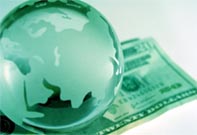Brown's role as pathfinder to come under scrutiny
 London - Just a few months ago, British Prime Minister Gordon Brown was hailed as a hero by fellow-European leaders for pushing ahead with massive bail-out packages to save the banks and the economy.
London - Just a few months ago, British Prime Minister Gordon Brown was hailed as a hero by fellow-European leaders for pushing ahead with massive bail-out packages to save the banks and the economy.
Once the coordinated action had been agreed, and a threatened total collapse had been averted, Brown presented himself as the "saviour of the world" to the British parliament.
He had meant to say "saviour of the banks," an embarrassed spokesman explained.
A few weeks later, there was another slip of the tongue. It was vital to avert a "depression," Brown told parliament, meaning to say "recession."
The "d-word" was out, and it was clear for everyone to see that Brown, well-versed in global economic affairs, is haunted by the prospect of a downturn that could turn into a full-blown depression.
As rescue packages are slow to bite, and opinion polls at home show a decline of Brown's popularity in parallel with a resurgence of the Conservatives, the prime minister is a man in a hurry.
Brown is determined to see a fundamental reform of post-war financial institutions, greater regulation for global markets and - above all - the prevention of protectionism.
"De-globalization," he has repeatedly warned, is the greatest threat to the world economy.
In order to prevent it, the British government will press for a strong commitment against protectionism, and ensure that the topic will get little mention at the summit of G20 nations in London in April, government officials insist.
"Gordon Brown is Adam Smith reincarnated when it comes to this kind of stuff," said a close adviser, comparing the premier to the leading 18th century advocate of free trade.
But while Britain urges a "clear no to protectionism," the Commission of the European Union (EU) warned in a guidance paper to governments recently that the single market would disintegrate amid financial protectionism if member countries pursued uncoordinated rescue plans.
Nationalist moves to sort out banks' so-called toxic assets, and the granting of government loan guarantees to ailing industries in itself represented a protectionist threat, said the document.
At forthcoming summits in Berlin, Brussels and London, Brown is likely to be confronted with criticisms of his bold bail-out policies from, among others, Germany and France.
Peer Steinbrueck, Germany's outspoken finance minister, is on record as saying that national stimulus plans were "in some ways inherently protectionism."
French President Nicolas Sarkozy launched a broadside against Brown recently when he said Britain's recovery plans, and the cut in Value-Added Tax, had "not worked."
Hailing his own policies of large-scale investment in construction and other industries to revive the economy, Sarkozy said Brown could not do the same because there was "no industry left" in Britain.
Such harsh criticism from supposedly friendly nations hurt Brown at home, where the Conservatives have said that world leaders "increasingly disagree" with Brown's anti-recession policies.
To make matters worse, even the governor of the Bank of England, Mervyn King, conceded recently that bankers and politicians are uncertain as to what tools to apply next.
Continued gloomy predictions, and a feeling of great uncertainty, make it harder for Brown to play the pathfinder out of crisis once more, one analyst said. (dpa)